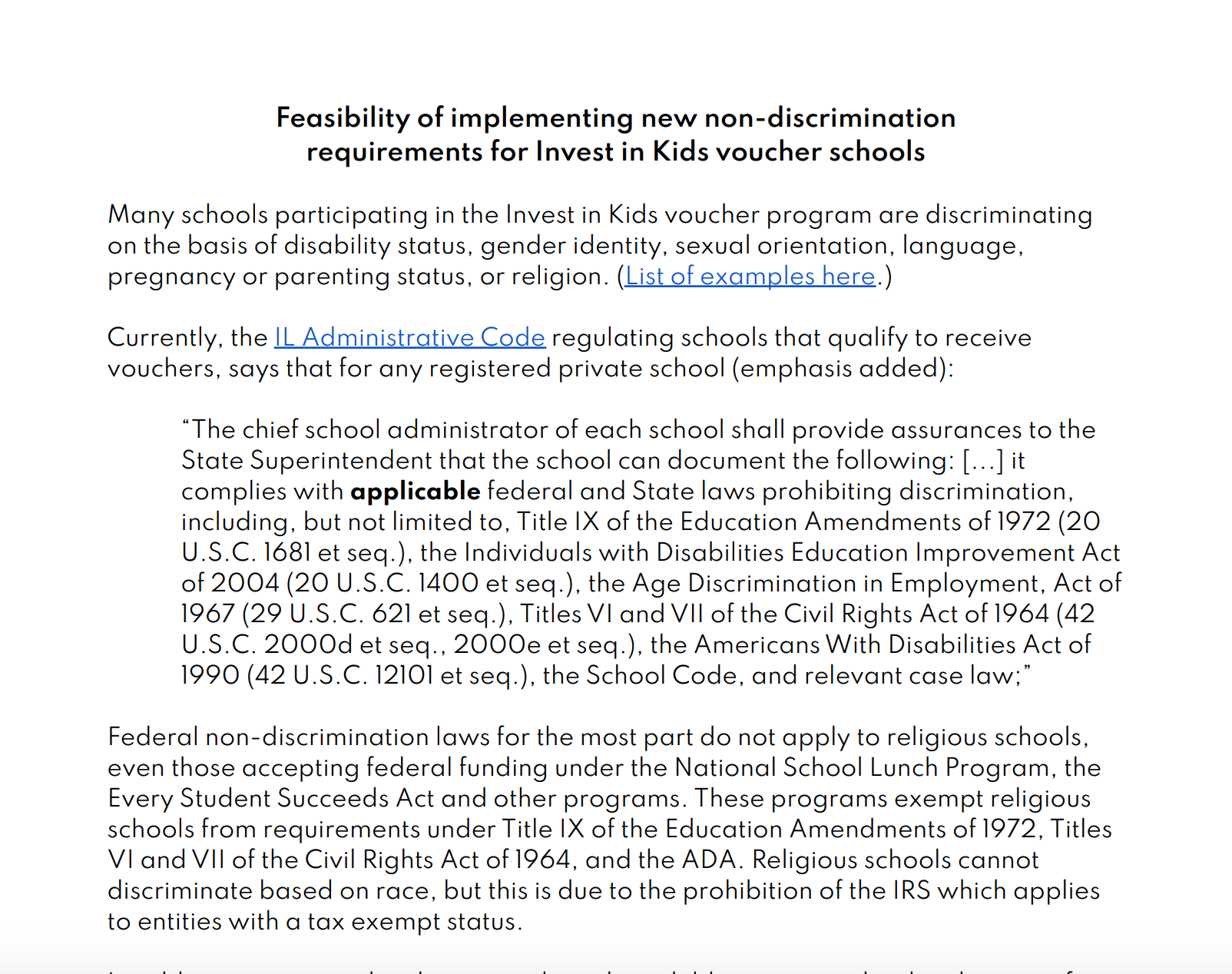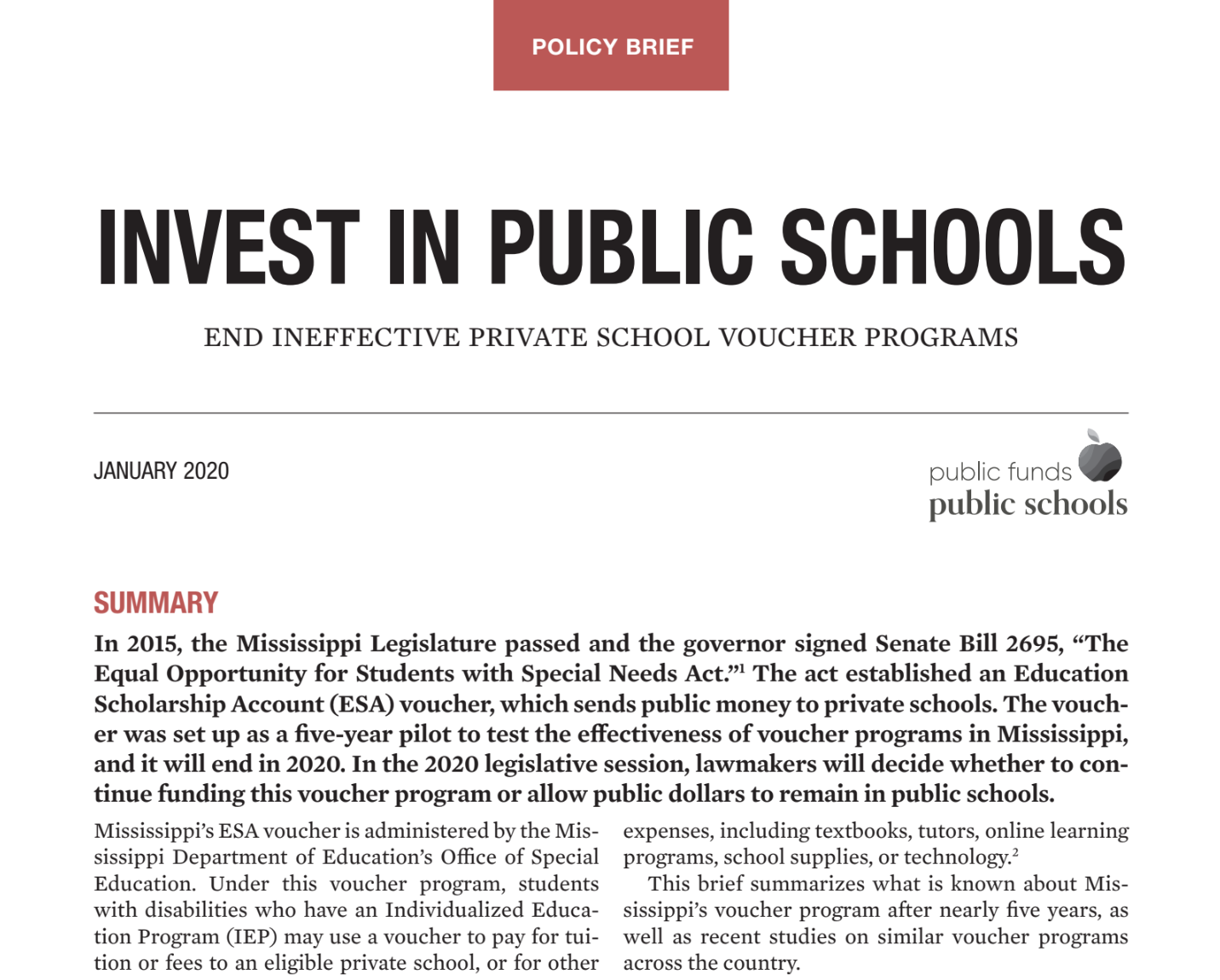
INSIGHT
Voucher programs do not consistently prevent discrimination.
School voucher programs create an illusion of parental choice. In reality, private schools choose their students.
These schools can refuse to admit students who speak different languages, have special needs, belong to certain religions, or come from diverse backgrounds. Students who are LGBTQ+ or have LGBTQ+ parents can also be turned away. Voucher programs typically do not bar this discrimination. Students with the greatest needs are the most likely to be excluded from schools that accept vouchers.
Students with disabilities may even be required to waive their protections by federal special education laws in order to enroll in private schools. When voucher programs grow, public schools, which welcome and serve all students, end up with fewer resources to support them.
Vouchers emerged in the United States as a tool to combat public school integration in southern states following the 1954 Supreme Court decision in Brown v. Board of Education. Led by Virginia, state legislatures provided public funds for white students to attend private schools — often referred to as “segregation academies.”
A new era of vouchers rebranded as “school choice” has swept the country in recent years, including Ohio, resurrecting segregation academies on wealth and racial lines.
Since 2023, state legislators across America have introduced more than 200 bills to create or expand private school vouchers, using taxpayer funds to reimburse families who choose to send their children to private schools. Supporters of vouchers claim they promote “school choice” or even promote equity. The reality is they drain crucially needed resources from public education, the only system enshrined in all 50 states’ constitutions and committed to educating all students, regardless of abilities, economic circumstances, race, religion, gender or special needs.
Billions in taxpayer dollars are being used to pay tuition at religious schools throughout the country, as state voucher programs expand dramatically and the line separating public education and religion fades.
Supporters of Wisconsin’s voucher schools make it seem that the schools are just one of many variations of our public schools. Don’t be fooled.
In Pennsylvania, as anywhere else in America, private schools can do pretty much whatever they want. They can refuse to accept disabled or LGBTQ applicants. They can expel students for getting pregnant and even for merely having LGBTQ friends outside of school. At the same time, they can require applicants’ families to attend church, not to mention teach students that God created the universe in six days.
The Republican supermajority gave final passage in the Senate to Alabama’s school choice legislation as it now awaits signature from Gov. Kay Ivey.The bill, the CHOOSE Act, was passed 23-9 after apparent pressure from the governor’s office because Ivey has stated school choice is a top priority. The bill would create an education savings account, ESA, for $7,000 to help parents pay for the cost to send their children to private schools primarily.
Many schools participating in the Invest in Kids voucher program are discriminating on the basis of disability status, gender identity, sexual orientation, language, pregnancy or parenting status, or religion.
State law prohibits public schools from discriminating against students on the basis of sex, sexual orientation or disability, but it does not extend the same protections to private schools — even those receiving public funds.
In an early December interview with Business Matters, Governor Josh Shapiro once again voiced his support for school vouchers. Voucher advocates who had been stung by his veto of their previous attempt to bring more vouchers to Pennsylvania probably took heart.
This is the fifth and final part in our series, Private School Vouchers: Analysis of 2020 Legislative Sessions. This annual PFPS analysis provides an overview of proposed voucher legislation nationwide and deeper dives on key states and issues. Read the first, second, third, and fourth parts.
Public schools in Illinois can't discriminate on the basis of disability status, gender identity, sexual orientation, language, pregnancy or parenting status, marital status, or religion. But under the Invest in Kids voucher program, public dollars are now going to private schools in Illinois, many of which do discriminate against students in all these protected categories.
Education Voters of Pennsylvania developed this report on the $340 million in annual funding for EITC and OSTC programs that provide taxpayer-supported vouchers to students who attend private and religious schools.
Illinois Families for Public Schools developed these talking points in English and Spanish on how the Invest in Kids voucher program hurts equity.
The Education Law Center-PA wrote this letter urging the senate to reject SB 795. Funding private schools with public dollars, as this bill proposes, will not move the Commonwealth a single dollar closer to its constitutional mandate, which is to support and maintain a contemporary, effective public education system accessible to every child in the Commonwealth, regardless of their school district’s local wealth. In fact, it does the opposite, redirecting funds away from public schools and making compliance with the court ruling harder to achieve.
This policy brief focuses on Mississippi’s ESA voucher program. In 2015, the Mississippi Legislature passed and the governor signed Senate Bill 2695, “The Equal Opportunity for Students with Special Needs Act.”1 The act established an Education Scholarship Account (ESA) voucher, which sends public money to private schools. The voucher was set up as a five-year pilot to test the effectiveness of voucher programs in Mississippi, and it will end in 2020. In the 2020 legislative session, lawmakers will decide whether to continue funding this voucher program or allow public dollars to remain in public schools.
This webinar features Dr. Preston Green, Professor of Educational Leadership and Law at the University of Connecticut and the John and Maria Neag Professor of Urban Education at the Neag School. Dr. Green has extensive knowledge of education law and has published numerous articles and book chapters on legal and policy issues related to educational access and school privatization. Dr. Green discusses school voucher programs and how these programs fail to provide civil rights and constitutional protections to students. He also discusses protections for students participating in voucher programs.
















